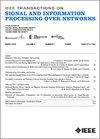利用数据驱动的迭代学习控制实现多代理系统的有限时间非对称双方共识
IF 3
3区 计算机科学
Q2 ENGINEERING, ELECTRICAL & ELECTRONIC
IEEE Transactions on Signal and Information Processing over Networks
Pub Date : 2024-03-11
DOI:10.1109/TSIPN.2024.3375602
引用次数: 0
摘要
本文研究了具有完全未知非线性的多代理系统的一般有限时间两方共识问题。通过引入与比例相关的系数和与关系相关的指数,定义了非对称双方差共识任务,该任务安排各代理达成具有比例模数和相反符号的协议。在合作-对抗交互作用下,提出了一种无模型自适应双方差迭代学习共识协议,以提高有限时间间隔内的性能精度。通过矩阵变换和非负矩阵的特性,保证了在结构平衡的数字图具有定向生成树的情况下,MAS 误差的迭代渐近收敛。这与基于矩阵规范证明的 MFAILC 结果不同,后者不需要数字图的强连接性。此外,还提出了估算相关矩阵中元素的边界,并提供了图相关充分条件,以指导控制参数的选择。结果进一步扩展到非对称双方格共识跟踪的控制。仿真实例验证了分布式学习控制协议的有效性。本文章由计算机程序翻译,如有差异,请以英文原文为准。
Finite-Time Asymmetric Bipartite Consensus for Multi-Agent Systems Using Data-Driven Iterative Learning Control
A general finite-time bipartite consensus problem is studied for multi-agent systems with completely unknown nonlinearities. An asymmetric bipartite consensus task is defined by introducing a proportional-related coefficient and a relationship-related index, which arranges that the agents reach an agreement with proportional modulus and opposite signs. With the cooperative-antagonistic interactions, a model-free adaptive bipartite iterative learning consensus protocol is proposed for promoting the accuracy of the performance within a finite-time interval. By employing the matrix transformation and property of the nonnegative matrix, the iteratively asymptotic convergence of the error of the MAS is guaranteed under the structurally balanced digraph has an oriented spanning tree. This differs from MFAILC results that have been proven based on matrix norm and do not require strong connectivity of digraphs. Moreover, the bounds for elements in the estimation-related matrices are presented, followed by providing a graph correlated sufficient condition to guide selection of control parameters. The results further extend to the control of asymmetric bipartite consensus tracking. The simulation examples verify the effectiveness of the distributed learning control protocols.
求助全文
通过发布文献求助,成功后即可免费获取论文全文。
去求助
来源期刊

IEEE Transactions on Signal and Information Processing over Networks
Computer Science-Computer Networks and Communications
CiteScore
5.80
自引率
12.50%
发文量
56
期刊介绍:
The IEEE Transactions on Signal and Information Processing over Networks publishes high-quality papers that extend the classical notions of processing of signals defined over vector spaces (e.g. time and space) to processing of signals and information (data) defined over networks, potentially dynamically varying. In signal processing over networks, the topology of the network may define structural relationships in the data, or may constrain processing of the data. Topics include distributed algorithms for filtering, detection, estimation, adaptation and learning, model selection, data fusion, and diffusion or evolution of information over such networks, and applications of distributed signal processing.
 求助内容:
求助内容: 应助结果提醒方式:
应助结果提醒方式:


